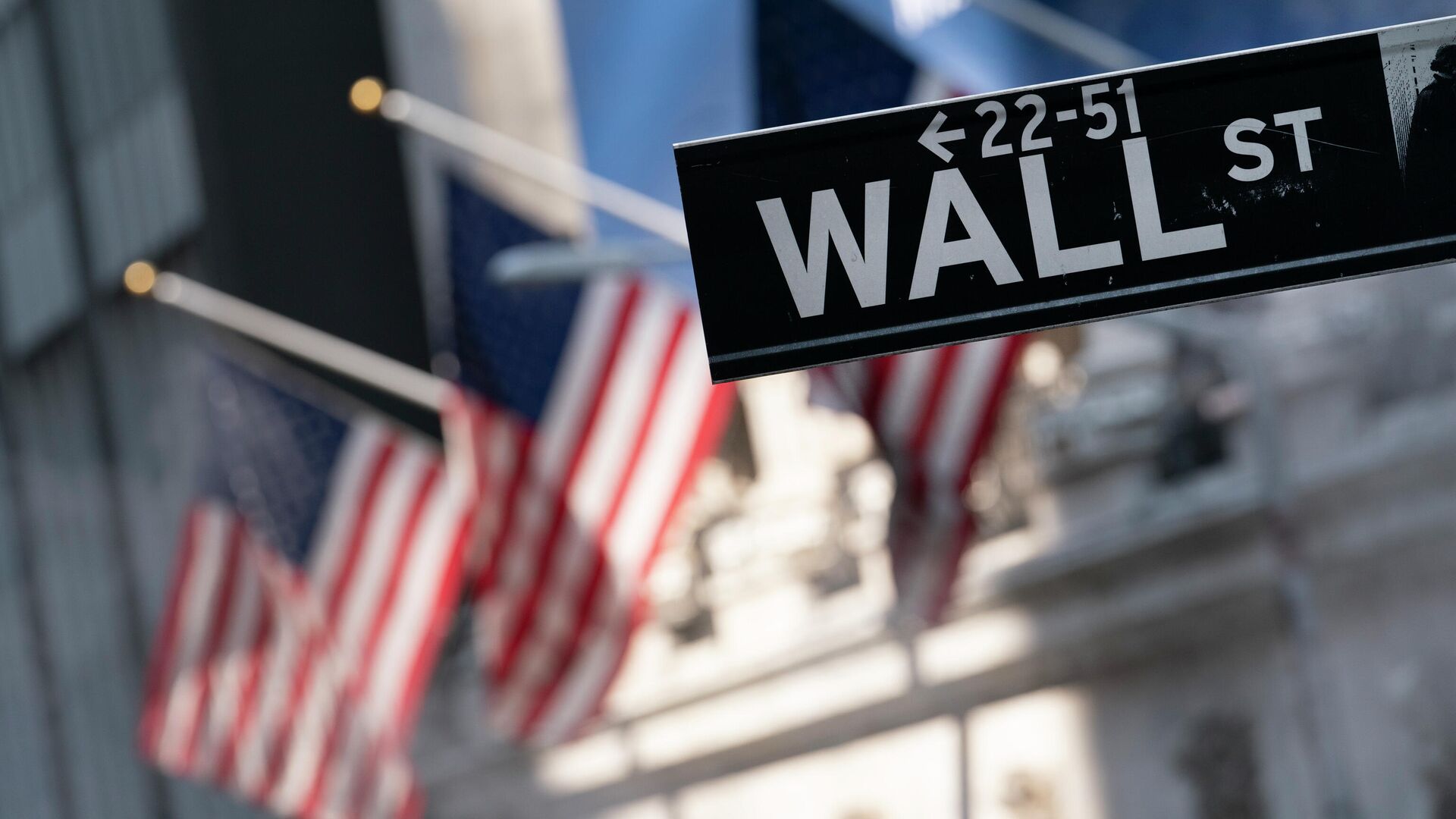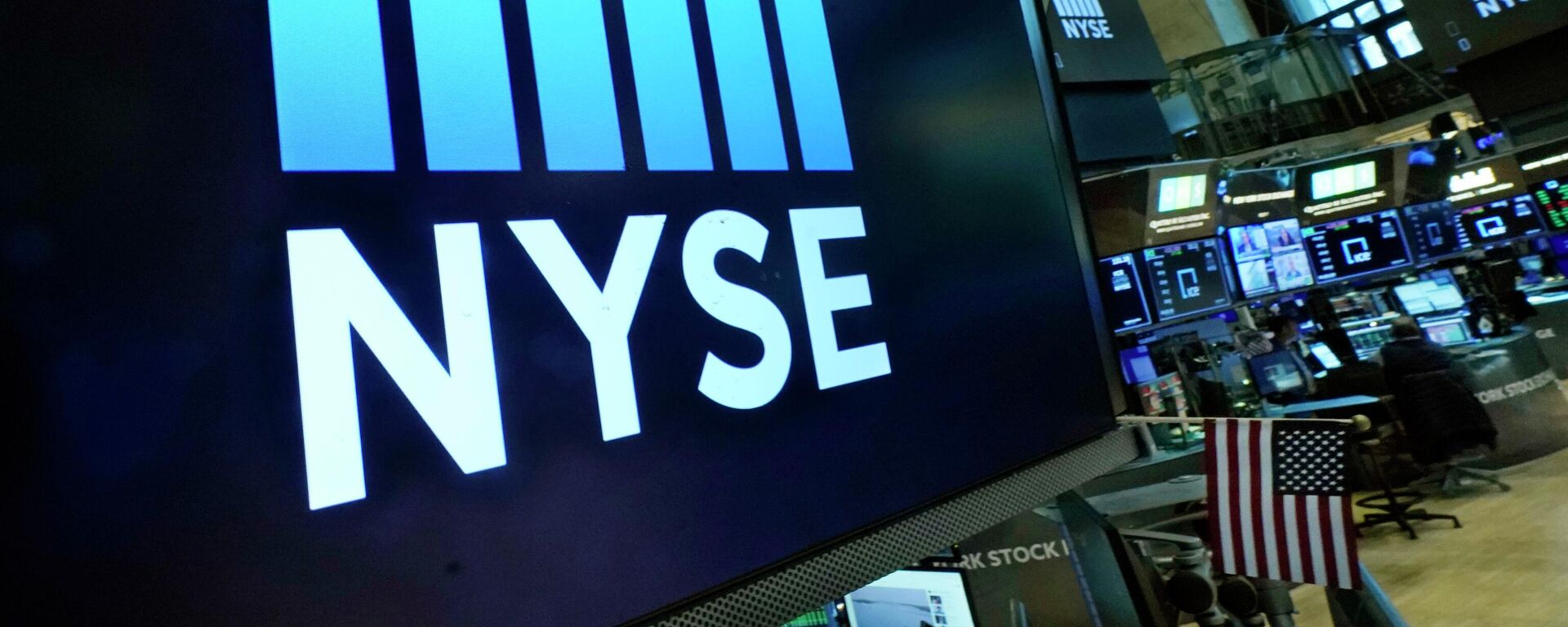https://sputnikglobe.com/20220408/wall-streets-big-tech-plunges-most-in-week-since-january-on-us-interest-rate-hike-fears-1094602741.html
Wall Street's Big Tech Plunges Most in Week Since January on US Interest Rate Hike Fears
Wall Street's Big Tech Plunges Most in Week Since January on US Interest Rate Hike Fears
Sputnik International
YORK (Sputnik) - Wall Street’s Big Tech sector suffered its biggest weekly loss since January as investors dumped pricey stocks on fears that US interest rates... 08.04.2022, Sputnik International
2022-04-08T22:04+0000
2022-04-08T22:04+0000
2022-04-08T22:04+0000
us stocks
business
us
inflation
big tech
https://cdn1.img.sputnikglobe.com/img/07e5/0c/1d/1091898098_0:160:3073:1888_1920x0_80_0_0_dc3a54311c14d579f9f8236642e29554.jpg
The three key US stock indexes - the S&P 500, the Dow Jones Industrial Average and the Nasdaq Composite - closed down 1.1% on the average on Friday. For the week, they fell by an average of 1.9%.Nasdaq Composite, which houses the biggest technology names of the world, including Amazon, Apple, Netflix and Google, fell 1.3% on the day and 3.9% on the week. It was its biggest weekly loss since the week to January 14, when it fell 7.6%.Stocks tumbled this week as policy-makers at the Federal Reserve signaled readiness to embark on the sharpest interest rate hikes since the 1980s to blunt inflation also ramping-up at the fastest rate in four decades.Often, when crisis strikes on Wall Street, Nasdaq is the first target of selloffs by investors who typically run toward value stocks as bond yields rise.In line with that, the Dow Jones Industrial Average, which lists travel, aviation and other so-called value stocks compared to the Nasdaq, finished up 0.4% on Friday 34,721. For the week though, the Dow was down 0.3%, extending last week’s dip of 0.1%.The S&P 500 - which groups the top 500 US stocks - fell 0.2% on the day to 4,.491. For the week, it lost 1.2%.After slashing rates to nearly zero at the height of the COVID-19 outbreak, the US central bank’s policy-making Federal Open Market Committee (FOMC) approved the first pandemic-era rate hike on March 16, raising rates by 25 basis points, or a quarter point.Many FOMC members have concluded since that the hike was too tame to rein in inflation galloping at 40-year highs and that more aggressive increases of 50 basis points may be needed in the future. The central bank is also considering as many as seven rate adjustments this year.The pace of interest rate hikes suggested by Bullard implied that the Federal Reserve should embark on 50 basis point, or half-point increases, at each of its six remaining meetings for the year. The central bank’s typical target for inflation is 2% per year.
https://sputnikglobe.com/20220407/wall-street-up-after-2-day-drop-but-off-highs-on-hawkish-interest-rate-hike-talk-1094571106.html
Sputnik International
feedback@sputniknews.com
+74956456601
MIA „Rossiya Segodnya“
2022
Sputnik International
feedback@sputniknews.com
+74956456601
MIA „Rossiya Segodnya“
News
en_EN
Sputnik International
feedback@sputniknews.com
+74956456601
MIA „Rossiya Segodnya“
Sputnik International
feedback@sputniknews.com
+74956456601
MIA „Rossiya Segodnya“
us stocks, business, us, inflation, big tech
us stocks, business, us, inflation, big tech
Wall Street's Big Tech Plunges Most in Week Since January on US Interest Rate Hike Fears
YORK (Sputnik) - Wall Street’s Big Tech sector suffered its biggest weekly loss since January as investors dumped pricey stocks on fears that US interest rates might go up their most in 40 years to offset runaway inflation.
The three key US stock indexes - the S&P 500, the Dow Jones Industrial Average and the Nasdaq Composite - closed down 1.1% on the average on Friday. For the week, they fell by an average of 1.9%.
Nasdaq Composite, which houses the biggest technology names of the world, including Amazon, Apple, Netflix and Google, fell 1.3% on the day and 3.9% on the week. It was its biggest weekly loss since the week to January 14, when it fell 7.6%.
Stocks tumbled this week as policy-makers at the Federal Reserve signaled readiness to embark on the sharpest interest rate hikes since the 1980s to blunt inflation also ramping-up at the fastest rate in four decades.
Often, when crisis strikes on Wall Street, Nasdaq is the first target of selloffs by investors who typically run toward value stocks as bond yields rise.
Likewise, this time around, “Wall Street is looking at surging Treasury yields and swapping out tech stocks for more defensive plays such as energy, financials, healthcare and materials”, Ed Moya, analyst at the online trading platform OANDA, said.
In line with that, the Dow Jones Industrial Average, which lists travel, aviation and other so-called value stocks compared to the Nasdaq, finished up 0.4% on Friday 34,721. For the week though, the Dow was down 0.3%, extending last week’s dip of 0.1%.
The S&P 500 - which groups the top 500 US stocks - fell 0.2% on the day to 4,.491. For the week, it lost 1.2%.
After slashing rates to nearly zero at the height of the COVID-19 outbreak, the US central bank’s policy-making Federal Open Market Committee (FOMC) approved the first pandemic-era rate hike on March 16, raising rates by 25 basis points, or a quarter point.
Many FOMC members have concluded since that the hike was too tame to rein in inflation galloping at 40-year highs and that more aggressive increases of 50 basis points may be needed in the future. The central bank is also considering as many as seven rate adjustments this year.
The pace of interest rate hikes suggested by Bullard implied that the Federal Reserve should embark on 50 basis point, or half-point increases, at each of its six remaining meetings for the year. The central bank’s typical target for inflation is 2% per year.


